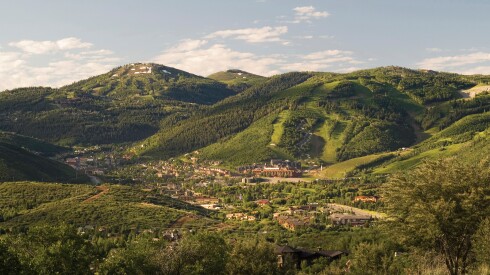The coronavirus pandemic has changed our days dramatically: how we shop, work, school our children, plan a vacation, eat at restaurants. But it’s not all bad. For some families and remote workers, the flexibility brought on by working from home and distance learning has allowed them to actually have some greater freedom in terms of where they take their Zoom calls and where their kids log on to the day’s lessons.
As schools across the country start back up again this fall, many of them virtually, some families have taken a silver-lining approach to this challenging situation and have uprooted to dream destinations.
Sound appealing? It did to us. So we wanted to find out how those who have already done this pulled it off. They filled us in on the do’s and don’ts—may their tips, advice, and personal tales of road-tripping across America and relocating to island paradises empower families who might want to do the same.
The beginnings of a WFP life
Before you start taking notes and plotting your own WFP (work from paradise) journey, always be sure to be up to date on coronavirus-related travel restrictions and public health precautions, whether you’re planning to travel domestically or abroad. Some states have quarantine and travel restrictions in place, and many countries still won’t let Americans visit—let alone live and work there. That said, there are also countries actively courting “digital nomads” and remote workers and families for longer-term residence. If you do your research, in terms of health, safety, and logistics, these families have shown us that it can be done.
Imagine living rent-free
For travel blogger and producer Skye Mayring (known in the blogosphere as Joan Jetsetter), her husband Jake Mikosh, and their one-year-old daughter, once Mikosh’s job went fully remote, they saw it as an opportunity to set off from their base in Los Angeles.
“I think that a lot of remote workers in big cities are asking themselves, ‘Why do we still live here?’ There’s nothing really tying them to the city, and it doesn’t make sense to keep paying high rents when everything is shut down. Living the untethered life might just be the way to reset, pursue new interests, and experience a sense of freedom that many of us haven’t felt in a while,” says Mayring.

Skye Mayring, her husband Jake Mikosh, and their young daughter recently packed up all their belongings and hit the road from Los Angeles.
Courtesy of Skye Mayring
Mayring and Mikosh put their belongings into storage at the end of June and have been road-tripping around the Southwestern United States ever since. As of early September they were exploring Marfa, Texas. The family has been staying at a combination of Airbnbs, their Texas vacation home, and house sitting for friends who had also hit the road (house swap, anyone?). They are en route to Las Vegas, where they will rent a condo for a couple months and also plan to visit Zion National Park in Utah. “After that, we don’t really know where we’ll end up,” says Mayring.
You will need reliable internet (repeat, you will need reliable internet)
Remote work and school fundamentally rely on one key resource—the internet.
That became very clear to Sam Keller and his family, who relocated to Tahiti from Mill Valley, California, this month after Keller was laid off from a real estate tech firm and his wife’s San Francisco–based tech job announced that employees could work from home until August 2021.
French Polynesia, a group of 118 islands in the South Pacific, including Tahiti and Bora Bora, reopened to travelers from all countries on July 15. You must have proof of a negative COVID-19 test taken no later than 72 hours prior to your flight and then take another test several days after arriving. You can find more information about traveling to Tahiti on the Tahiti Tourism website.
Armed with their negative COVID test results, Keller and his family then had to sort out whether the internet in Tahiti would be fast and reliable enough for his wife to effectively do the back-to-back Zoom calls her job requires. The answer was yes—provided the internet came via fiber optic cable (versus a digital subscriber line, aka DSL).
The family is currently staying in an Airbnb home that doesn’t have fiber optic cable, “so the kids’ Zoom calls are spotty,” says Keller. Keller’s wife has been using a coworking space in the capital city of Papeete, which has required managing some rush-hour traffic to get there in time for calls. On September 12, the family will be moving into a rental home where the owner, at the family’s request, is getting the fiber optic cable installed.
Keller is documenting their journey on his blog.
Wait . . . what about school?

Sam Keller’s son logs onto a school Zoom call with something better than a virtual Zoom background.
Photo by Sam Keller
Believe it or not, it’s not necessarily virtual or bust when it comes to how to school your kids while on the road. Keller’s kids (a nine-year-old son in fifth grade and a five-year-old daughter in kindergarten) are enrolled at the Tahiti International School, a Montessori-based UNESCO school. While they get set up in Tahiti, the kids have been doing Zoom calls with their Mill Valley elementary school, but once the entire family completes another round of COVID tests that are required by the French Polynesian government, provided that the results are negative, the kids will be allowed to start attending in-person school (wearing mandatory masks).
Kids can, of course, also stick with the virtual learning options provided by their local schools, too, and simply log in from their destination. In this case, families will want to take into account possible time differences and whether that could help or hurt their cause. Will the kids have to get up pretty early to log on, but then be done early too? Does that work to your family’s advantage, or will it make things a bit harder?
For those interested in remote homeschooling (aka roadschooling) their kids for the foreseeable future, there are numerous online resources. Travel writer Janeen Christoff, who recently headed back out on the road with her husband and two daughters amid the pandemic, wrote about how to homeschool your kids while you travel in a story for AFAR last year, where she shares her tips and advice on the topic.
Don’t travel on work and school days—and use after-hours time for exploring
For Jen Campbell Boles, a travel advisor who runs the family travel agency Explore More Family Travel, the coronavirus pandemic presented a special opportunity to travel domestically instead of abroad, something she and her family did not do as much pre-COVID.
“Before COVID, our most recent trips had been to England, Greece, and Thailand. While I have always had a desire to see the national parks out West, I never thought about spending our vacation time there. That is why the ability to work and school our way through the big parks out West was so appealing,” says Boles.
The fact that they could see a large swath of the country without using too many vacation days was particularly enticing. Then, “when our boys’ school announced that there would be no in-person learning until at least after Labor Day, I saw our opportunity to just go. I planned the entire trip in a couple of days and we were off.” Her sons—twin seven-year-old first graders—started school on August 17, and there’s a chance they’ll return to school two days a week sometime this month, so they wanted to take the trip while the whole family was fully remote.

Why not ride horses when school is done for the day?
Photo by Jen Campbell Boles
Because they planned an itinerary that required being on the move every few days, Boles says one of her biggest pieces of advice “is to sit still on the days you plan to work and school. Because we are based on the East Coast, we were able to take advantage of the time difference. I would finish the boys’ schooling by lunch every day and have time to do some exploring with them. My husband was off of work by 2 or 3 p.m. local time, so we were also able to do things as a family after work.”
This is, in essence, one of the major advantages of this type of travel. If everyone is still having to work and go to school, the opportunity lies in the ability to explore a new place after-hours and on weekends.
For example, while staying in Jackson Hole, Wyoming, Boles and her family spent one afternoon taking a covered wagon ride into a national forest where they had dinner and watched a western music show, followed up with a rodeo. Another day after school and work, they went to Grand Teton National Park for a boat trip, a short hike, and a swim.
OK, fine, that sounds slightly better than the fun after-school trip to the drive-through for some soft-serve that we have planned for our kids this week.
Be flexible and plan ahead—traveling during COVID can present challenges
One thing both Mayring and Boles mentioned was to be sure to be up to date on what’s open and available to visitors during the pandemic.
“If visiting some of the country’s national or state parks is high on your list, be sure to check each park’s COVID-19 updates and reopening information,” says Mayring. “When we arrived in Austin this summer, all of the local parks and swimming holes were closed but began partially reopening in August via an online ticketing system. In Fredericksburg, Texas, we had to reserve day passes for specific entry times to parks—sometimes weeks in advance—for popular attractions such as Enchanted Rock State Natural Area.”

Freelancer Skye Mayring advises families to get up-to-date information on what is open and whether advance reservations are needed.
Courtesy of Skye Mayring
Mayring notes that the earlier you can look into reservations, the better. For example, when they tried to book a swimming reservation in August for Jacob’s Well Natural Area, the popular swimming hole had already sold out for the rest of the year.
Boles says she was able to gain a lot of intel from fellow travelers and from social media regarding what was open and places to visit and made changes to their itinerary accordingly.
Opt for a podcast versus screen time
While on the road, if parents and kids have their faces in their screens while passing all the beautiful sights, that kind of defeats the whole purpose, no? A podcast is the perfect alternative, says Boles, especially for this longer-haul form of travel.
“We were adamant that [the kids] would not be on screens while on the scenic parts of our trip,” says Boles. Instead, the family listened to podcasts together and their favorite family podcast was Story Pirates. “Now, we have our own special inside jokes from the hours of episodes we listened to as a family. It is one of my favorite memories of the trip watching my boys giggle in the back seat as they picked up on the humor in the stories,” she says.
Make lemonade out of lemons

Amid the pandemic, Sam Keller relocated with his family to Tahiti, where they are literally working and going to school from paradise.
Photo by Sam Keller
At the end of the day, the most inspiring aspect of these stories is the ways in which these families took such a challenging time and turned it into a positive experience.
“Why work from home if you can work from Tahiti?” says Keller. “Now’s your chance to think and act big.”
Quite frankly, whether you choose to follow in their footsteps or not, that outlook alone is enough to bring some much-needed optimism into our lives.











